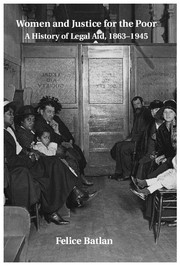Book contents
- Frontmatter
- Contents
- List of Plates
- Acknowledgments
- Abbreviations of Primary Organizations
- Introduction
- PART I A FEMALE DOMINION OF LEGAL AID, 1863–1910
- PART II THE PROFESSIONALIZATION OF LEGAL AID, 1890–1921
- PART III DIALOGUES: LAWYERS AND SOCIAL WORKERS, 1921–1945
- 5 Constellations of Justice
- 6 Compromises
- Conclusion
- Index
- Plate Section
5 - Constellations of Justice
from PART III - DIALOGUES: LAWYERS AND SOCIAL WORKERS, 1921–1945
Published online by Cambridge University Press: 05 May 2015
- Frontmatter
- Contents
- List of Plates
- Acknowledgments
- Abbreviations of Primary Organizations
- Introduction
- PART I A FEMALE DOMINION OF LEGAL AID, 1863–1910
- PART II THE PROFESSIONALIZATION OF LEGAL AID, 1890–1921
- PART III DIALOGUES: LAWYERS AND SOCIAL WORKERS, 1921–1945
- 5 Constellations of Justice
- 6 Compromises
- Conclusion
- Index
- Plate Section
Summary
Lawyers did not achieve their goal of removing social workers from legal aid organizations. Instead, social workers demonstrated that attorneys' professionalization of legal aid was neither preordained nor linear. Many social workers developed their own understanding of how legal aid should be conceived, challenging Reginald Heber Smith's theories of the rule of law and what constituted justice. Social workers and their allies embraced a more substantive concept of justice, free from legal technicalities. Throughout the 1920s, lawyers and social workers battled over professional authority, competencies, the meaning of justice, and the various ways of providing legal aid. The National Association of Legal Aid Organizations, led by John Bradway, became the key site for these confrontations and negotiations.
These opposing views of legal aid raised two central questions: what services should legal aid provide and which clients should legal aid serve? Scholars have long noted legal aid societies' conservative nature, but social workers and some lawyers presented an alternative and potentially more expansive vision. Lawyers also never had the monopoly over law that they sought. Social workers (and the new schools of social work that they created) taught law to their primarily female students, and social workers staffed many legal aid organizations. These women blurred the boundary between law and social work, and they insisted on raising larger questions about the nature of justice.
In 1922 at the first convention of the new National Association of Legal Aid Organizations, NALAO president Leonard McGee, who was also chief attorney for the Legal Aid Society of New York, called social work and social workers “the most dangerous” issue ever faced by legal aid organizations. Their presence in legal aid organizations could “destroy public confidence,” he said, and “deter the poor” from seeking help. McGee presented the conflict in stark terms. One side believed that a legal aid society was a law office for poor people and should function like any other law office. The other side believed that legal aid was part of social services and had a duty to the community and the client that extended beyond providing legal services.
- Type
- Chapter
- Information
- Women and Justice for the PoorA History of Legal Aid, 1863–1945, pp. 157 - 184Publisher: Cambridge University PressPrint publication year: 2015



